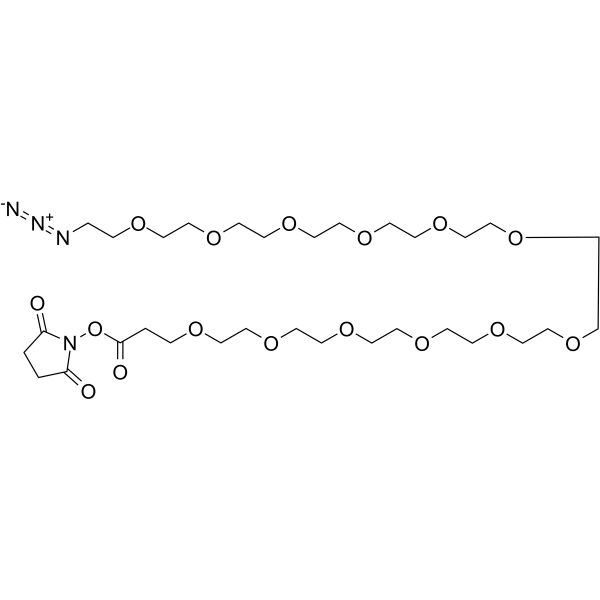
Azido-PEG12-NHS ester
CAS No. 2363756-50-5
Azido-PEG12-NHS ester ( —— )
产品货号. M26894 CAS No. 2363756-50-5
Azido-PEG12-NHS 酯是一种基于 PEG 的 PROTAC 连接体,可用于 PROTAC 的合成。
纯度: >98% (HPLC)
 COA
COA
 Datasheet
Datasheet
 HNMR
HNMR
 HPLC
HPLC
 MSDS
MSDS
 Handing Instructions
Handing Instructions
| 规格 | 价格/人民币 | 库存 | 数量 |
| 5MG | ¥632 | 有现货 |


|
| 10MG | ¥915 | 有现货 |


|
| 25MG | ¥1499 | 有现货 |


|
| 50MG | ¥2211 | 有现货 |


|
| 100MG | ¥3151 | 有现货 |


|
| 200MG | ¥3864 | 有现货 |


|
| 500MG | ¥6334 | 有现货 |


|
| 1G | 获取报价 | 有现货 |


|
生物学信息
-
产品名称Azido-PEG12-NHS ester
-
注意事项本公司产品仅用于科研实验,不得用于人体或动物的临床与诊断
-
产品简述Azido-PEG12-NHS 酯是一种基于 PEG 的 PROTAC 连接体,可用于 PROTAC 的合成。
-
产品描述Azido-PEG12-NHS ester is a PEG-based PROTAC linker that can be used in the synthesis of PROTACs.(In Vitro):PROTACs contain two different ligands connected by a linker; one is a ligand for an E3 ubiquitin ligase and the other is for the target protein. PROTACs exploit the intracellular ubiquitin-proteasome system to selectively degrade target proteins.
-
体外实验PROTACs contain two different ligands connected by a linker; one is a ligand for an E3 ubiquitin ligase and the other is for the target protein. PROTACs exploit the intracellular ubiquitin-proteasome system to selectively degrade target proteins.
-
体内实验——
-
同义词——
-
通路Others
-
靶点Other Targets
-
受体Ole1| Stearoyl-CoA Desaturase (SCD)
-
研究领域——
-
适应症——
化学信息
-
CAS Number2363756-50-5
-
分子量740.801
-
分子式C31H56N4O16
-
纯度>98% (HPLC)
-
溶解度——
-
SMILES[N-]=[N+]=NCCOCCOCCOCCOCCOCCOCCOCCOCCOCCOCCOCCOCCC(=O)ON1C(=O)CCC1=O
-
化学全称——
运输与储存
-
储存条件(-20℃)
-
运输条件With Ice Pack
-
稳定性≥ 2 years
参考文献
1.Vincent BM, et al. Inhibiting Stearoyl-CoA Desaturase Ameliorates α-Synuclein Cytotoxicity. Cell Rep. 2018 Dec 4;25(10):2742-2754.e31.
产品手册




关联产品
-
G-1749
G-1749 does not alter the monomer-dimer equilibrium of IRE, stimulates the RNase activity of unphosphorylated IRE1 and inhibits IRE1-3P, and significantly increases the RNase activity of IRE1-KR-0P.
-
Myristoylated Protei...
Myristoylated Protein Kinase C (19-31)
-
Crustacean Cardioact...
Crustacean Cardioactive Peptide (CCAP), amide



 021-51111890
021-51111890 购物车()
购物车()
 sales@molnova.cn
sales@molnova.cn







